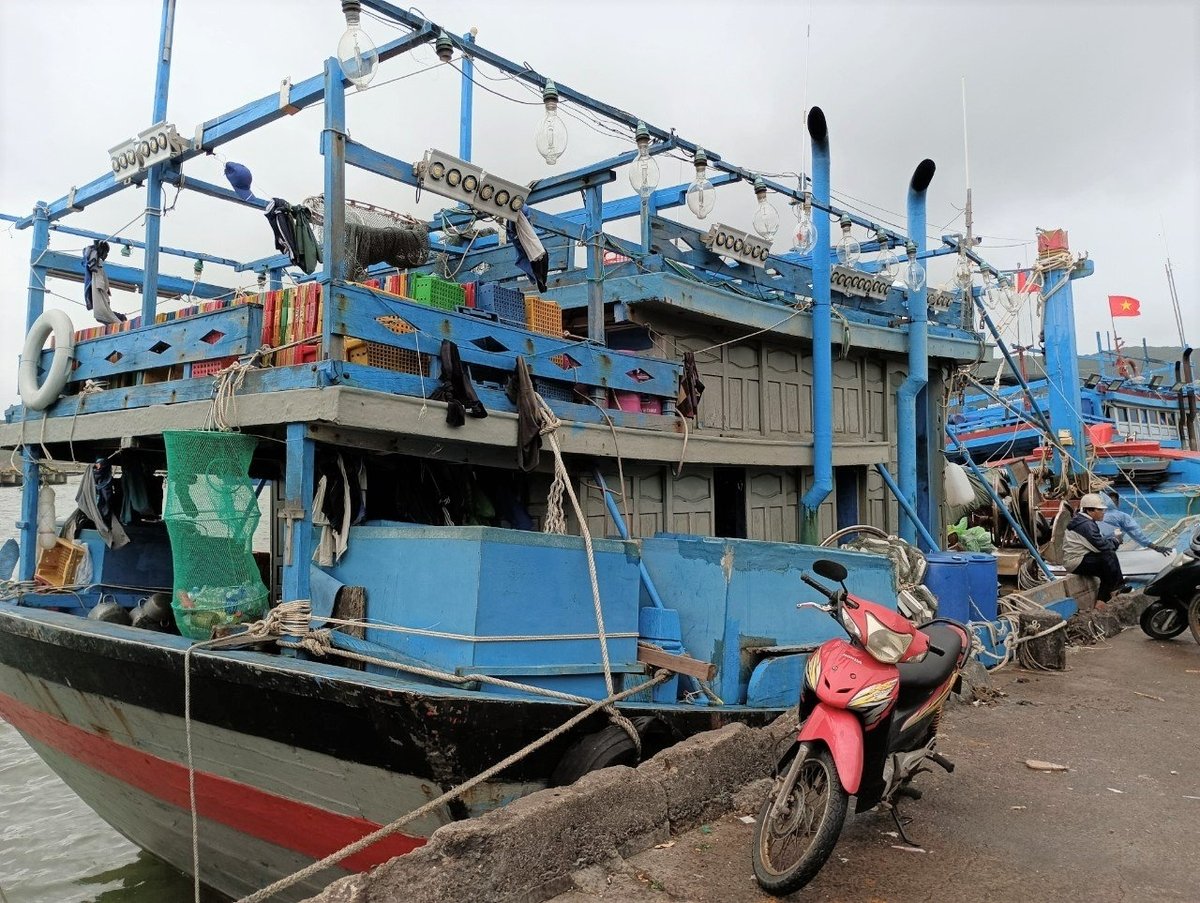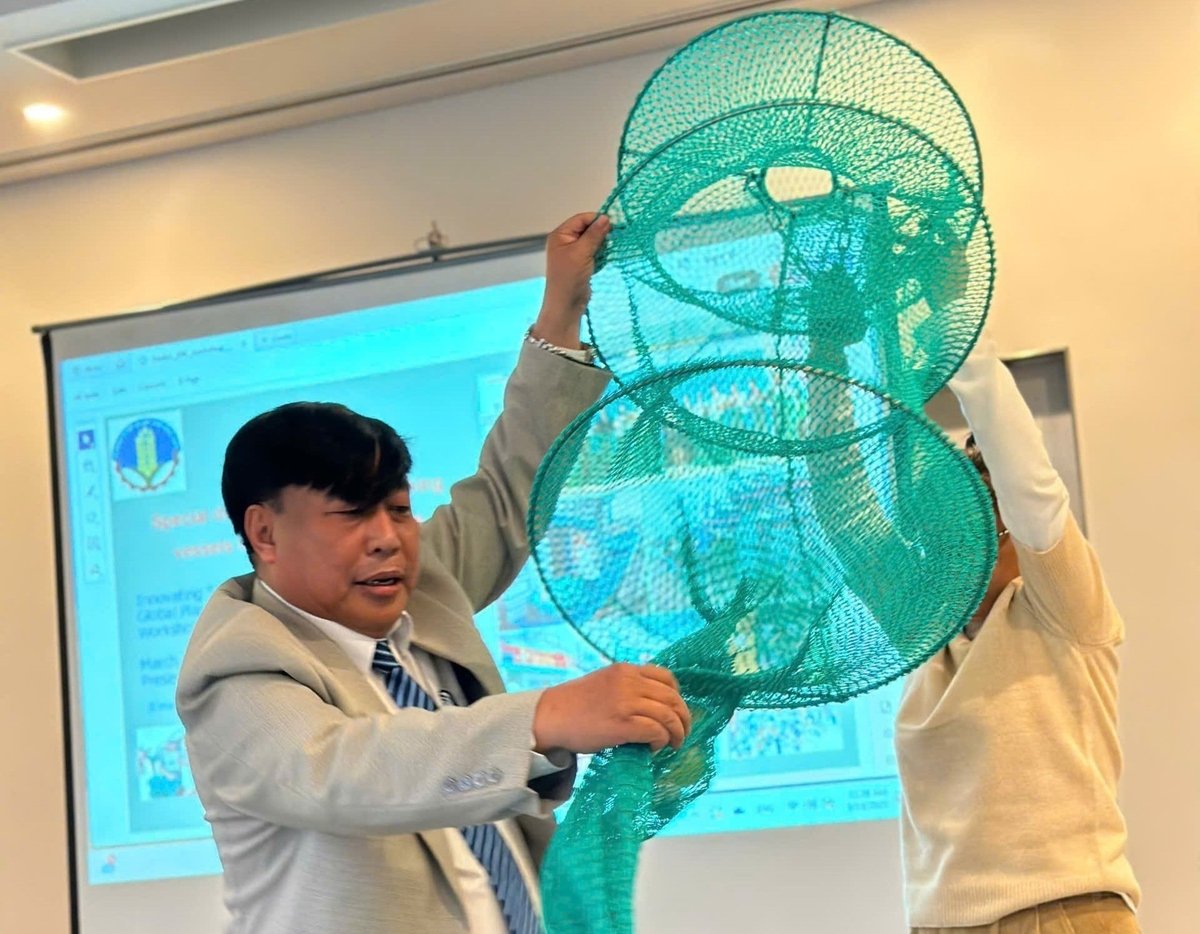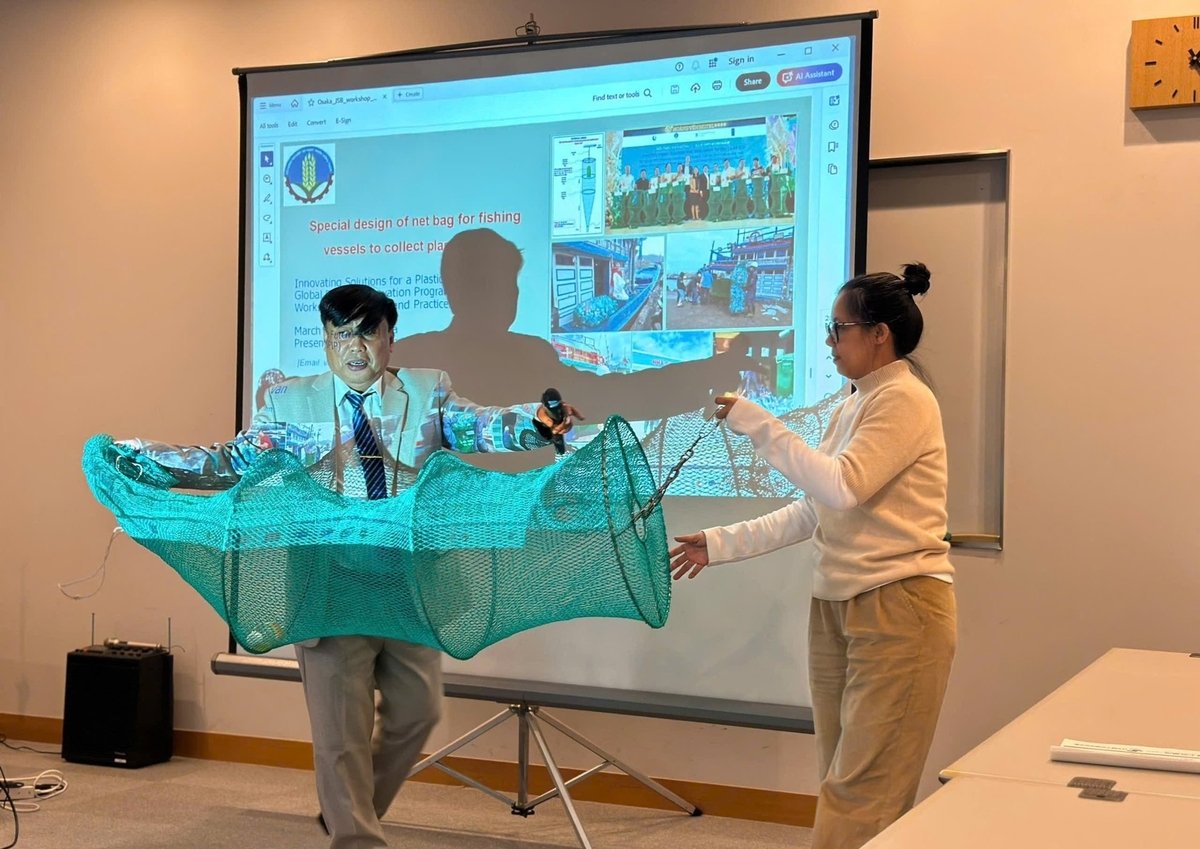December 10, 2025 | 05:20 GMT +7
December 10, 2025 | 05:20 GMT +7
Hotline: 0913.378.918
December 10, 2025 | 05:20 GMT +7
Hotline: 0913.378.918
According to Mr. Tran Van Vinh, Deputy Director of the Binh Dinh Sub-Department of Fisheries, Binh Dinh province has previously provided offshore fishing vessels with trash bins to collect waste and bring it back to shore for proper disposal, thanks to support from various projects. However, due to the nature of offshore fishing operating in open waters and constantly exposed to strong winds and waves, these bins often proved ineffective. In many cases, trash bins placed on the decks were blown overboard by the wind. Moreover, the rough sea conditions frequently knocked the bins over, spilling waste across the deck, creating a mess and taking up valuable time for fishermen to clean.
In response to feedback from offshore fishermen, Mr. Vinh took the initiative to design a mesh trash bag that could withstand wind and wave conditions from level 8 to level 10. What makes this bag especially practical is that it can be hung anywhere on the vessel. Even in rough seas with strong winds and high waves, the bag can rotate freely without tipping over or spilling its contents, unlike traditional trash bins. The bag is designed with three compartments, can be folded neatly when not in use, and has a side opening for depositing waste.

Fishing vessel trash bags hung where they don’t interfere with fishing activities. Photo: Vu Dinh Thung.
Mr. Tran Van Vinh shared that the waste generated by a single fishing vessel during a sea voyage lasting 20 to 30 days typically ranges from 13.5 to 15 kilograms. With approximately 3,000 offshore fishing boats operating in Binh Dinh province, if waste is not collected, the province’s fishing fleet could contribute around 4.5 tons of waste into the ocean on just one fishing trip.
“Through my research on waste management, I realized that plastic waste generated by fishermen working on offshore vessels is considerable, such as water bottles and plastic bags used to store seafood,” said Mr. Vinh. “If this waste is discharged into the sea, it will seriously harm the marine environment. That’s why I designed a trash collection bag specifically for fishing boats, one that fits with the customs and habits of our fishermen.”

Mr. Tran Van Vinh, Deputy Director of the Binh Dinh Sub-Department of Fisheries, presented a fishing vessel trash bag at the marine plastic waste reduction workshop in Japan. Photo: T.V.V.
Following the signing of Phase II of the project “Piloting Solid Waste and Fishery Waste Management Models to Promote the Circular Economy in Quy Nhon city” between the United Nations Development Programme (UNDP), the Binh Dinh Provincial People's Committee, and Quy Nhon city, Mr. Vinh proposed the idea of developing a plastic waste management model for fishing vessels.
“I outlined the approach, methodology, and how to classify plastic waste onboard in a way that’s convenient for fishermen. From there, I designed a trash ‘basket’ in the form of a bag - something visually appealing, safe, low-cost, easy to use, and environmentally friendly,” Mr. Vinh shared.
Mr. Vinh's main goal when designing the mesh trash bag was to make plastic waste collection easy and practical for fishermen to bring back to shore after a trip.
“The mesh trash bag for fishing vessels is low-cost, easy to implement, and scalable. I drew inspiration for the design from the traditional mesh fish bags that fishermen often use when fishing. A long, funnel-shaped bag that can be hung on the boat. This makes it feel familiar and comfortable for them,” Mr. Vinh explained.

Delegates from the Philippines, Indonesia, Laos, Japan and other countries at the marine plastic waste reduction workshop expressed enthusiasm for the fishing vessel trash bag. Photo: T.V.V.
Upon closer inspection, the trash bag is designed in a circular, free-rotating shape. Notably, it is built to withstand external forces from strong waves and wind while the vessel operates at sea, without deforming. The bag can also be folded for flexible use, taking up far less space on board than traditional plastic trash bins.
Nguyen Thanh Long, an offshore fishing boat owner from Hoai Huong Ward (Hoai Nhon town, Binh Dinh province), shared: “We place the plastic waste collected during our fishing trips into the trash bag through its round, tube-shaped opening made from soft mesh. There’s no way for the trash to fall out. Once the boat returns to shore, we open the bottom of the bag and the waste empties out automatically. It’s very convenient. And because the bag is made of mesh, if it gets damaged, we can easily patch it using fishing line or nylon. It’s both practical and efficient.”
“In mid-March 2025, I was nominated by the Binh Dinh Fisheries Department to attend the Workshop on Combating Marine Plastic Waste in Japan. At the workshop, I presented an innovative solution and design for a specialized mesh bag used to collect plastic waste on fishing vessels. My design was honored with the ‘Zero-Plastic Hero Award.’ Delegates from the Philippines, Indonesia, Laos, and Japan were all very interested in Vietnam’s trash collection bag,” shared Mr. Tran Van Vinh, Deputy Director of the Binh Dinh Sub-Department of Fisheries.
Translated by Kieu Chi
![Unlocking carbon credit potential: [1] Toward a green economy](https://t.ex-cdn.com/nongnghiepmoitruong.vn/608w/files/huyenvt (e)/2025/12/09/1340-2-130237_804.jpg)
(VAN) Thanh Hoa is advancing the development of carbon credits from forests and agriculture, generating sustainable income, improving livelihoods, and moving toward a green and low-emission economy.

(VAN) After three years, Project FST/2020/123 collected approximately 3,000 insect specimens, classified them into about 50 morphological groups, and identified around 40 species, including several new species.
/2025/12/01/0509-2-175427_206.jpg)
(VAN) Emission-reducing coffee areas in Lam Dong have entered the new crop with stable yields, improved quality, and a remarkably enhanced cultivation environment.

(VAN) The Institute of Agricultural Sciences for Southern Vietnam (IAS) marked its 100th anniversary in Ho Chi Minh City, celebrating a century of growth as a leading institute contributing significantly to Viet Nam’s agricultural development.

(VAN) An increasing number of livestock farms are using biogas generators to create a source of renewable electricity, helping to save costs and mitigate environmental pollution.

(VAN) Small changes in rice cultivation, from irrigation methods and straw collection to input management, are paving a new way for Vietnam's agriculture in the journey toward emission reduction.

(VAN) With the project of converting biogas into renewable electricity, Australia is both helping pig farms reduce their energy costs by up to 25% and contributing to environmental protection.